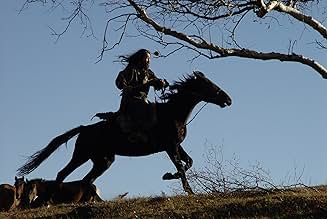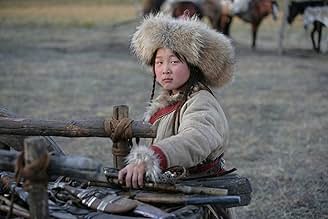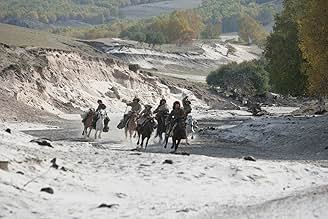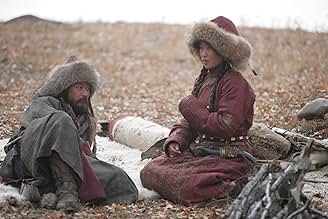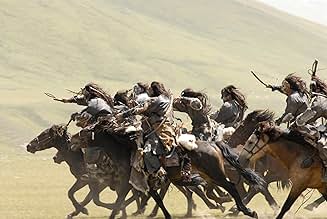Le vicende dell'infanzia, dell'adolescenza e dell'ascesa al potere del giovane Temugin, al secolo noto come Gengis Kahn, il grande conquistatore che, all'inizio del 13mo secolo, riuscì a riu... Leggi tuttoLe vicende dell'infanzia, dell'adolescenza e dell'ascesa al potere del giovane Temugin, al secolo noto come Gengis Kahn, il grande conquistatore che, all'inizio del 13mo secolo, riuscì a riunire le tribù mongole sotto il suo comando arrivando a conquistare gran parte dell'Asia.Le vicende dell'infanzia, dell'adolescenza e dell'ascesa al potere del giovane Temugin, al secolo noto come Gengis Kahn, il grande conquistatore che, all'inizio del 13mo secolo, riuscì a riunire le tribù mongole sotto il suo comando arrivando a conquistare gran parte dell'Asia.
- Regia
- Sceneggiatura
- Star
- Candidato a 1 Oscar
- 16 vittorie e 13 candidature totali
- Oelun - Temudjin's Mother
- (as Aliya)
- Esugei - Temudjin's Father
- (as Ba Sen)
- Sorgan-Shira
- (as A You Er)
- Altan
- (as Hong Jong Ba Tu)
- Daritai
- (as E Er Deng Ba Te Er)
- Girkhai
- (as Su You Le Si Ren)
Recensioni in evidenza
The cinematography is gorgeous and the subtitle script is excellent.
What really makes this film great are the performances and the action scenes.
When he gains followers and unites Mongolia you understand why.
Hopefully the film will get people to read more about the original man and discover the historical inaccuracies.
Of course as historical accuracies go it much more accurate then Elizabeth: The Golden Age.
Contradicting the Western (and Russian) image of Genghis as the monstrous conqueror, Bodrov's work is influenced by Lev Gumilev's "The Legend of the Black Arrow" and is based on "The Secret History of the Mongols," the 13th century Mongolian account, unknown until its re-emergence in China 700 years later. For a director, who learned in school only about the horrors of Russia's 200-year subjugation by the Mongols, taking a "larger view" is a remarkable act.
Unlike Omar Sharif in the 1965 Henry Levin "Genghis Khan" or Takashi Sorimachi in Shinichiro Sawai's disappointing 2007 "To the Ends of the Earth and Sea," Tadanobu Asano in Bodrov's film is strictly Temudjin, not the great Khan. He lived from 1162 to 1227, and "Mongol" covers the years between 1171 and the beginning of the unification of Mongolian tribes around the turn of the century.
In fact, the spookily powerful child Temudjin (Odnyam Odsuren) dominates the first part of the film, undergoing trials and tribulations that make the lives of Dickens' abused and imperiled children look like a picnic. From age nine into his 30s, Temudjin was orphaned, hunted, imprisoned, enslaved, and constantly threatened by extinction. Literally alone in the vast landscape (brilliantly photographed by Rogier Stoffers and Sergei Trofimov), Temudjin escapes death repeatedly, at times almost mysteriously.
"Mongol" is huge - with endless vistas and epic crowd scenes, quite without special effects - but Bodrov keeps the setting just that, never strutting visuals for their own sake. The film is about people, and the cast is magnificent. Asano's face and eyes hold attention, and make the viewer experience simultaneous feelings of getting to know the character he plays and being held at arm's length. Bodrov and Asano escape all the many Hollywood pitfalls in making an epic - they present nothing easy, predictable, trite. The term "Shakespearean" is used here advisedly.
The Mongolian actors are sensational: Khulan Chuluun is luminous as Borte, Temudjin's wife; Borte's 10-year-old self, the girl who chooses Temudjin, then 9, while he thinks he is the one making the decision, is unforgettable, even if the name is hard to remember: Bayertsetseg Erdenebat.
Chinese actors are vital to the film. As Temudjin's father (poisoned by Tatars before the boy reached 10), Sai Xing Ga makes an impression few actors can achieve in such a brief appearance. Nearly overshadowing Asano is the grand thespian exercise from Sun Hong-Lei, as Temudjin's all-important blood brother Jamukha. Sun is almost too big for the big screen, perhaps a less intense performance would have served the film better.
Another problem is near the end of "Mongol," with Borte's stranger-than-fiction (and actually fictional) rescue of Temudjin from a Tangut prison, years, hundreds of miles, and impossible alliances and dalliances telescoped into a few near-incongruous minutes - all to cover a 10-year-long gap in Genghis' history. Except for that, however, Bodrov's work is engrossing, spectacular, and memorable.
It's not a bad story, either, although not one that will keep you riveted to the screen for the full two hours. However, I wasn't bored, either, although some of the action scenes looked too repetitive with very hokey-looking special-effects concerning blood splashing out of people in the battle scenes. It did not look real, but as if it were drawn. It's ironic in that the production values seem to be so high with a such a nicely-filmed effort, yet the action scenes are staged like a B-movie.
In a nutshell, this is the story of how "Genghis Kahn," who is "Temudjin" throughout the movie, spent his tough early life and how he became the famous warrior. We just see how many hardships the man endured to become who he was later in life. He was never referred to as Genghis Kahn which, I learned hear, is a title more than a name. That must have come later, after he had control of all the Mongol armies, which is where the film ends.
Many times, it's a not a pleasant existence for "Temudjin," who was marked man from the age of nine. We see him spend many lonely hours held captive in different places. The looks on his face are memorable. Odnyam Odsuren ad the young "Temudjin" and Tadanobu Asano as the adult "Temudjin" both had extraordinarily photographic faces.
One of the few problems I had with the movie were understanding "the rest of the story" as certain scenes ended abruptly leaving me (and I assume other viewers) wondering "what happened?" His friends, though, were fun to watch and his bride was a beautiful, kind and strong woman, as pictured in this movie. Actually, I found this just as much of a love story as a war epic, and the romance angle was far more dramatic. The devotion the lead male and female had to each other, and the faithfulness and loyalty were inspiring, to say the least.
Lo sapevi?
- QuizDirector Sergei Bodrov and Production Designer Dashi Namdakov visited Mongolia's chief shaman in the capital city of Ulan Bator, so that they could ask permission to film a movie about Genghis Khan's life. The shaman told them that of all the people who have talked about making such a film, they were the only ones to ask his permission.
- BlooperThe Mongolian tribes, including the hordes that conquered their vast empire, rode on a very peculiar race of horses, stocky build, with relatively short legs and a large head. The horses used in the movie look like ordinary western horses
- ConnessioniFeatured in The 80th Annual Academy Awards (2008)
- Colonne sonoreBeginning
Composed By Tuomas Kantelinen
Performed by Hamburg Film Orchestra, The London Session Orchestra, One Orchestra, Altan Urag
© 2008 X-Filme Creative Pool GmbH.
(p) 2008 Kinofabrika GmbH & Tuomas Kantelinen Ensemble.
I più visti
Dettagli
- Data di uscita
- Paesi di origine
- Lingue
- Celebre anche come
- Mongol: The Rise of Genghis Khan
- Luoghi delle riprese
- Inner Mongolia, Cina(location)
- Aziende produttrici
- Vedi altri crediti dell’azienda su IMDbPro
Botteghino
- Budget
- 18.000.000 USD (previsto)
- Lordo Stati Uniti e Canada
- 5.705.761 USD
- Fine settimana di apertura Stati Uniti e Canada
- 135.326 USD
- 8 giu 2008
- Lordo in tutto il mondo
- 26.527.510 USD
- Tempo di esecuzione2 ore 6 minuti
- Colore
- Mix di suoni
- Proporzioni
- 2.35 : 1
Contribuisci a questa pagina








